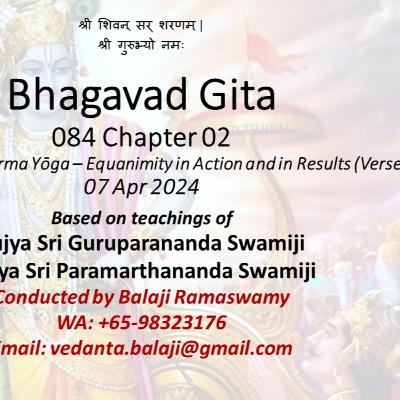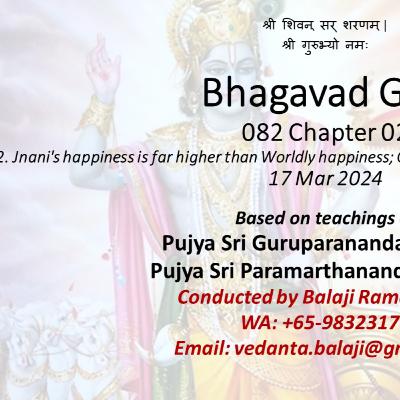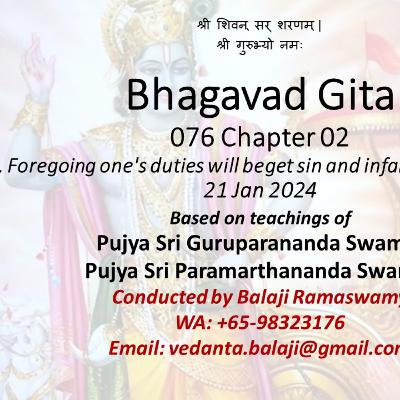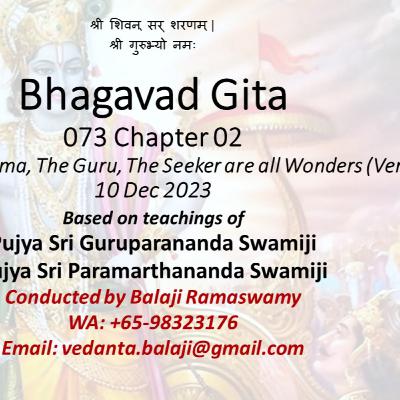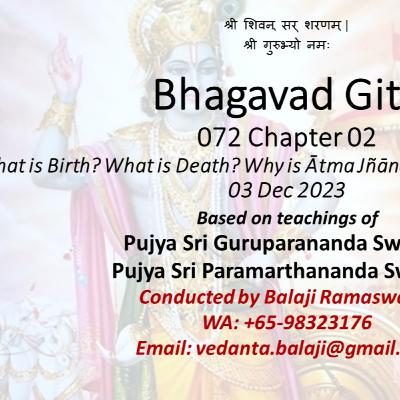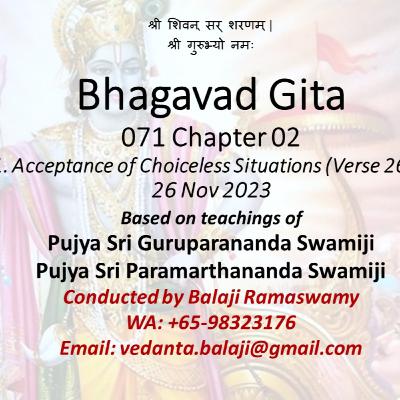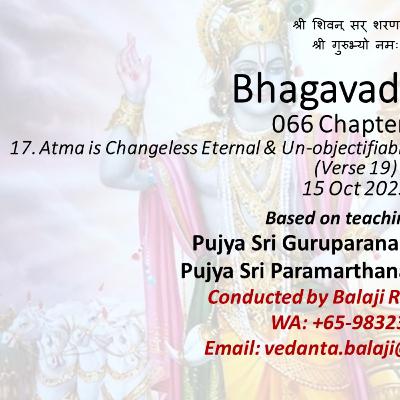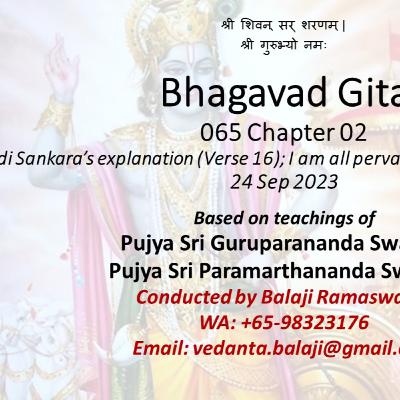Discover Bhagavad Gita | Advaita Vedanta | English | Balaji Ramaswamy | vedantabalaji@gmail.com
Bhagavad Gita | Advaita Vedanta | English | Balaji Ramaswamy | vedantabalaji@gmail.com

Bhagavad Gita | Advaita Vedanta | English | Balaji Ramaswamy | vedantabalaji@gmail.com
Author: Balaji Ramaswamy
Subscribed: 19Played: 134Subscribe
Share
© Balaji Ramaswamy
Description
Bhagavad Gita Explanation in English by Balaji Ramaswamy, Singapore based on the teachings of Swami Guruparananda and Swami Paramarthananda
For Any Feedback or to Attend Live Classes - WhatsApp +65-98323176
For Any Feedback or to Attend Live Classes - WhatsApp +65-98323176
85 Episodes
Reverse
Chapter 02 - Sankhya YogaSloka 48 (contd...) - Samatvam Yoga UchyateHow can all our actions be divided?What is Kartavyam jenma karma?What is Kaamya karma?Which one of these is optional?What are the 2 types of attitudes that we must have when performing karma yoga?How should Samatvam be defined with regard to performing our duties?How should Samatvam be defined with regard to results of our duties?Should we be affected by success or failure? Why not?When are we able to accept failures?What happens if I do not do my duty properly and face failure?When can we remain equipoised?Do duties and rights go together?What is our general attitude towards duties?To whom should I dedicate my duties if I expect my right over the other person's duties?Why should we dedicate duties to Ishvara and not an individual?What are the 3 issues when we expect our rights from the person to whom we have delivered our duties?Is every reciprocal arrangement equal? In a teacher-student relationship is the reciprocal arrangement equal?Is every reciprocal arrangement honoured?Does everyone show gratitude?How will Ishvara ensure I get my right?What is our fault when it comes to expecting return of favour or gratitude from the person to whom we performed our duty?Why is it considered business, if we do our duty expecting something in return?DEFINITION OF KARMA YOGAOh Ishvara, let me do my duty – whatever my prarbda generates / creates, as your command (as Ishvara Arpana), to my fullest potential with full commitment, without complaint or grumble, not allowing my likes and dislikes to interfere; taking both success & failure in my stride; without any expectation of return benefit or even gratitude from the other person – you please give me what I require at the time I require - I take it as your prasadaHow do we cultivate this habit?When should we pause & reflect?What should we do whenever we have an expectation; whenever our mind gets upset / distressed / sad; whenever we feel lazy; whenever we feel indifferent; whenever we feel like escaping; whenever we want to give an excuse?What are the 3 attitudes that one must have when performing duties?What is Kaamya karma?What should be our attitude towards this desire driven actions?Are we supposed to have any expectations on the result of the actions?What should be our attitude towards the result of the actions?What is the difference between enjoying something as prasada and enjoying something as sensory pleasure?Why is there a difference in our attitude and approach with the food served in temple and the food served in restaurant?What is the significance of animal sacrifice in rituals?How do Shashtras help bring in changes in the mindset of people who are at the lowest level of spiritual structure?What happens if we start dedicating (and taking as Ishvara Prasada) all our actions driven out of desires?Why do we have so many festivals in our religion?What happens to our animal instincts if we start taking all outcomes as Ishvara Prasada?
Chapter 02 - Sankhya YogaSloka 47 (contd...) - Principle of Karma YogaWhy should one not have desires in mind when performing duties?What happens when we perform an action with desire in mind?Does Papa & Punya create bondage?What happens when we perform our duties with no desires in mind?What is the first advice that Bhagavan gives in the second line of the sloka?When Bhagavan advises us not to be the cause of karma phala, how do we create the karma phala?What happens if we perform our duty with a sankalpa out of some desire?What is the second piece of advice that Bhagavan gives in the second line of the sloka?Why can there be a tendency to drop actions?What happens if we drop actions before mental purity?Would we be able to give up the sukha buddhi on vishaya when we drop the vishaya?Is being in Solitude easy?Summary of Facts1. We have a choice over all actions2. Once the action is completed, there is no right on the result of the action3. Even though there is no choice on the result, the bhavana while doing the action plus the adrashta punya papa collected over various jenmas will determine the fruit of that action4. If we decide to stay away from action because we cannot determine the result completely, Bhagavan says do not resort to inactionWhy are these facts important to know?What is the second way that this sloka can be interpreted?What is the definition of Saatvic tyaga?What happens if we sacrifice or renounce something without a steady sattva guna?What is the disadvantage of inaction?What is the advantage of action?Is withdrawal important?Which ashrama is pravrtti marga and which ashrama is Nivritti marga?What happens if we go directly to Sannyasa?Sloka 48 - Equanimity is called Karma YogaWhat is the definition of Karma yoga in this sloka?What are the 2 types of attitudes that we must have when performing karma yoga?How can all our actions be divided?What is Kartavyam jenma karma?What is Kaamya karma?Which one of these is optional?On what basis are our duties defined?Do we require someone to teach us on duties? What happens if we fail to do our duty?Do we like to perform all duties?What prevents us from performing some of the duties?What happens if our raga-dvesha gets in the way?How should Samatvam be defined with regard to performing our duties?When are we eager to perform some duties?When do we generally drop / skip duties?How should Samatvam be defined with regard to results of our duties?Should we take responsibility for the results of our duties?Why would the outcome of the action go against the intent of action?Should we be affected by success or failure? Why not?
Chapter 02 - Sankhya YogaSloka 46 (Contd...) - Jnana gives immense & infinite happinessDoes a jnani need karma kanda of Vedas? If not, why?What example does Bhagavan give to explain that?Will a small pond of water be useful for any person who has access to a large ocean like body of fresh water?What utility will karma kanda of vedas provide to a jnani?Will Karma yoga be of any utility to a jnani?Does a spiritual seeker need karma kanda of vedas?Does a spiritual seeker need karma yoga?What does "Yāvān artah udapāne" mean?What does "sarvataḥ saṃplutodake" mean?How much benefit is available in a pond when there is a flood everywhere?What does "Tāvān Sarveṣu vedeṣu" mean?What does "vijānataḥ brāhmaṇasya" mean?How much benefit the entire vedas can provide a "wise brahmin"?What term is used to call a person who has done jnana yoga sadana in this sloka?What term is used to call a person who is in sattva guna in this sloka?Who is a brahmin according to Upanishads?What is one who lives a disciplined life according to Vedas and to understand Vedas called?From what standpoint does the term brahmana have to be taken in jnana kanda and from what standpoint in karma kanda?What term is used in this sloka to denote a person who has lived the life of karma yōga?Why does the Karma kanda not be of any use to a vijānataḥ?Does Karma kanda and karma yoga help a spiritual seeker?Sloka 47 - Principle of Karma YogaHow can this sloka be interpreted?What are the 2 types of action that we perform?Does Karma yoga talk about action or attitude?Can we call any specific action karma yoga sadana?Are there any actions that are not allowed in Karma yoga?Why is karma yoga called "buddhih yōga"?Why is it necessary to have knowledge about how the world operates?What can convince ourselves to have the right attitude?How is understanding of a person or object related to the attitude?How is devotion related to knowledge of Ishvara?Do we have a choice based on our actions?Does Bhagavan say we have a choice over results?What is the FACT of life? Do we even have a choice once we have performed the action?Can we say "I did the job with a particular desire in mind and hence the result should be as per my desire."?Can we alter the course of the result?What is the expectation that we have of the result and why is it wrong?What are the 3 choices of action?What does "Kartum shakyam", "Akartum shakyam", "Anyata kartum shakyam" mean?Why should we be judicious and use our intelligence before acting?Can we have an expectation of the results?Is it right to get a doubt that if I have a right to action but not to results, why should I even act?What are the 2 outcomes to any action?Is adrashta phalam visible?What are punya and papa?When we do "dānam" to someone, what is the drshta and the adrashta phalam?When we steal something from others, what is the drshta and the adrashta phalam?How does the invisible bhaavana (attitude) determine the invisible adrashta phalam?If someone is doing charity work, will we know the attitude or the motive behind it? If two people use the knife and a life is lost in both cases, how come one gets punya and the other papa?If results depend on adrashta bhāvana then why are there disparities between the attitude and the results for an action?When the results of an action come, does it not come ONLY based on the attitude shown when performing that action, or does it also depend on the mixture of the papa and punya that we had accumulated over so many previous actions?Why does even when we put a lot of effort and have good attitude, the result does not match the effort and the attitude?And why do sometimes we put in a little effort and yet we get good results?What should our position be when we do not have a choice or where there is no privilege?Why should we not let our attitude be driven by our desires, especially when the attitude decides the results?
Chapter 02 - Sankhya YogaSloka 45 (Contd...) - Method to get clarity on the goal and the path2. (Contd...) Nirdvandvaḥ (bhava)Is there anyone in the world who will always have favourable situations?To act Equi-poised, is it enough if we understand it?Will understanding alone give the benefit?What should our attitude be when we face small difficulties?Is there anyone who will have no criticizers? What about a monk in the forest?What are the 3 different types of relationships that any person will have?What are the 2 conflicting views we will receive when we talk well / keep quiet?Why is Rama a great example of being equipoised?Will we be able to sleep when we are excited or when we feel cheated?3. Nityasatvasthaḥ (bhava) - (Be) ever established in SattvagunaHow can I get over the pairs of opposites?Will the mind always be in only 1 guna?When is the ideal time for the mind to be in Sattva?What is Sattva guna characteristics?What are the indications when we make right judgements or have clear discriminative power?What are the indications when we are not deluded and think rationally?What are the indications when we are calm and patient?How is being patient help in facing pairs of opposites?What is the benefit of being in Sattva guna?What is the benefit if we treat the pairs of opposites equally and if we have been able to overcome desires?How to be in Sattva guna?4. Niryōgakṣemaḥ (bhava) - (Be) free from (the concern for) acquisition and preservationWhat does Aprāpthasya Prāpthi mean?What does Prāpthasya Rakṣaṇam mean?What are the basic things that we require for survival?Why do some people acquire and accumulate whatever they find?Why do some people have 3 or 4 things of the same type?Why do some people keep certain things even though they may not be of any use now?What happens when latest designs or latest models of mobile phones, sarees, jewelry come out?What happens if we are always focused on acquiring and preserving things?What will be the concern of the things that we have accumulated as we grow old?What promise does Bhagavan make to his true devotee?What guna should one be in for acquiring and accumulating things?If one tries to avoid Rajo guna, to which guna will that person fall?5. ātmavān bhava - (Be) mindfulWhy should one be alert?What is the meaning that Śankarācārya gives?What does apramattaḥ bhava mean?How can one not be careless?What guna should one not be in to be alert?What are the characteristics of Tamo guna?What does Laziness, Delusion, Carelessness indicate?The steps that Bhagavan has given:1. ātmavānbhava -Be Free from Tamo Guna. Be alert2. niryōgakṣemaḥbhava –Be free from Rajo Guna. Be free from (the concern for acquisition and preservation. Then what?3. nityasatvasthaḥ(bhava) (Be) ever established in Sattvaguna. Only after one becomes a jnani, a person crosses even sattva guna. Until then the seeker has to be in sattva. If we were in sattva guna, how would that person be?4. nirdvandvaḥbhava Be free from (the hold of) the pairs of opposites. If we had crossed the pairs of opposites5. Nistraiguṇyōbhava means niṣkāmobhava. We would have overcome desires. There would be no demands from us. Whatever life has to offer, we will accept that and lead our life. If we do that, what will we getVyavasyātmikabuddhi –We will have clarity on Sadyamand Sādana. And we will follow the sādanas, reach the sadyamand attain mokshaEven if we are not able to be fully on every sādana, we should follow at least a little bit of eachSloka 46 - Karma Yoga will lead to MokshaWhat is the essence of this sloka?How does Bhagavan articulate that?Will the karma kanda of the vedas be of any use to a person who has attained jnana?What would have a karma yogi be sacrificing until he attains jnana?How will that sacrifice be seen by others?Why do many people look at Sannyasis with pity?What does a person attain when he sacrifices small pleasures?
Chapter 02 - Sankhya YogaSloka 42-44 (Contd...) - Karmi gets enamored by MaterialistsWhat are the 3 words that Bhagavan uses to describe the words they speak?1. yām imāṃ puṣpitāṃ vācam - such flowery wordsWhat does "yām imāṃ puṣpitāṃ vācam" mean?What is the analogy of the words they speak with a tree?How do they seduce us?2. jenma karma phala pradām - which lead to further birthsWhat does "jenma karma phala pradām" mean?What sloka from Bhaja Govindam talk about "Punarapi jananaṃ punarapi maraṇaṃ"?3. kriya viśeṣa bahulām - full of specific ritesWhat does "kriya viśeṣa bahulām" mean?What do they talk about?What are the examples of projects that these people talk about?What will be the casualty because of all these talks?Where will it all lead to?What is the underlying reason for which these words are spoken?What does "bhoga iśvarya gatim prati" mean?What do these people have their goals as?Why is "bhōgaisvarya" the same as arta-kāma puruṣārtha?Is money and pleasure a means for them or their goal?Will the Vivekis be enamored by their words?What happens to the Avivekis?What are these Avivekis attached to?What happens to their minds when they listen to these words?What does "Apahṛta cetasāṃ" mean?What happens when the mind gets carried away?What happens to the sense of conscience, sense of discrimination, sense of propriety, sense of honesty, sense of justice?What is the formula for happiness in terms of desires?What happens to the desires in their mind?Will they seek only legitimate method of fulfilling them?Will clear understanding take place in their mind?Do such people have clarity in terms of their goals?What is the meaning of "Samādhi" in this sloka?Do they have clarity on lakshya and sādana?Sloka 45 - Method to get clarity on the goal and the pathIs desire alone enough to have "vyavasāyātmikā buddhiḥ"?How many sādanas is Bhagavan giving here to attain vyavasāyātmikā buddhiḥ?What is required for anyone to follow a sādana?What is the information that Bhagavan is giving about Vedas?What does the word "traiguṇya viṣayāḥ" mean?Which part of Vedas are referred here when Bhagavan says "vedāḥ" here?How does "traiguṇyam" mean samsara?What are the 3 gunas?Which chapter is dedicated to these 3 gunas?What is Sattva guna about?What is Rajo guna about?What is Tamo guna about?Is our mind a mixture of 3?Will it have a predominant guna at any point in time?Which is the lowly guna? Which is the highest among the 3?Can someone move from Tamo guna to Sattva guna directly?Does all 3 gunas bind us?Which guna leads us to laziness, sleep, delusion?Which guna leads us to desire, action, jealousy?Which guna leads us to peace, knowledge, calmness?When the vedas deal with these 3 gunas what happens to our desires?1. Nistraiguṇyō bhavaWhat is the first of the 5 sadanas that Bhagavan advises?What is "nistraiguṇyō bhava" mean?What is "niṣkāmo bhava" mean?What is Vairagya?How can we get Vairagya?What reasons should we bring to our mind to be able to get that virtue?Is the world permanent or impermanent?Even if the world is impermanent, is it not giving me enjoyment?Is the enjoyment fulfilling or leaves me more craving?Even if it does not satisfy me completely, is it without any sorrow?Is the world happiness only mixed with sorrow?Can one get Vairagya easily?Can one have vairagya on everything?What should our attitude towards pleasure and comfort be?Should we have a lot of demands in our life?Do we look for comfort even during pilgrimage?What should be our attitude towards discomfort?Should we be enslaved to comforts?2. Nirdvandvaḥ (bhava)What does dvandva mean?What is the meaning of māna-apamānah, lābhanaṣṭa, jayā-apajaya?What does "nirdvandvaḥ" mean?What is the definition of this world?What does "dwandatmaka jagat" mean?How do we need to treat desireless situations?What does be equi-poised mean?What is irritation? How is it related to Samsara?
Chapter 02 - Sankhya YogaSloka 41 - Karma yogi is single mindedHow is Karma yogi's mind and attitude?What does the word "vyavasāyātmikā" mean?What is the Karma yogi determined on?What is a Karma Yogi's singular goal?Do people know the real purpose of life?What do most people take it to be their goals?How does life's goals for most people change with their age?What is the path / sādana that a Karma yogi knows for attaining the ultimate goal?What goals do non-Karma yogis have?Why are these goals changing?Why are these goals so many?Why does a Karma yogi have only 1 goal according to Adi Sankara?From where has Karma Yogi identified the goal to be moksha?What should be the pramana / source of knowledge that one must use to identify life's goal?Why do people who come to spirituality get confused about the goal and sadana?Where does a confused person end up at the end of a spiritual quest?What are the common questions that people have with regard to religion & culture?Sloka 42-44 - Karmi gets enamored by MaterialistsWhy does a person not have a straight singular focused goal?What do the different sense organs mean for?What is the meaning of "Stotrasya bhooshanam Sastram"?Why do people get misled?Who misleads them?Who is to be blamed?Why do people get deluded?What does bhogaiśvaryam mean?What does Bhagavan call the misleaders?What are the 5 adjectives that Bhagavan uses for these misleaders?1. avipaścitaḥ-Unintelligent people who believe in materialistic successWhat does "avipaścitaḥ" mean?Why does Bhagavan call them unintelligent ones?What is success according to them?What are these people's goals? What should be our takeaway when we listen to this portion?2. vēdavādaratāḥ-Enamored by Karma Kanda; focusing on arthakāmaWhat does "Vēdavādaratāḥ" mean?Which portion of Vedas are they enamored by?Why do they chant mantras, do pooja, perform rituals, go for pilgrimage?What does Avahanti Homa ask for?Does vedas talk about material accomplishments alone?Which portion of the vedas will give us emotional & spiritual growth?What does rājasa karma ratāḥ, sakāma karma ratāḥ mean?3. nānyadastītivādinaḥ-Who argues there is nothing else than enjoymentWhat does "na asti anyat, vādinaḥ iti" mean?What do these people argue about?What is there apart from materialism?How interested are these people when we talk about morality, ethics, Ishvara, religion, service etc?What is their motto in life/?How does Upanishad call them?What does "pramūḍhaḥ" mean?4. kāmātmānaḥ-who are full of desiresWhat does "kāmātmānaḥ" mean?What is these people embodiments of?What do these people think constantly?5. svargaparāḥ-who believe in heaven as the ultimate goalWhat does "svargaparāḥ" mean?Why do they want to go to heaven?Is there a permanent heaven?Is there a permanent hell?How does Bhagavan describe the words they speak?What does "Pravadanti" mean?What do they say?What kind of philosophy do these people spread?What happens when we try to convert them?Which wins more often in the minds of people - materialism or Spiritualism?Which is more attractive - Brahman or Maya?What are the 3 words that Bhagavan uses to describe the words they speak?1. yām imāṃ puṣpitāṃ vācam - such flowery wordsWhat does "yām imāṃ puṣpitāṃ vācam" mean?What is the analogy of the words they speak with a tree?How are the words they speak - are they attractive / tempting / seducing?How do they seduce us?2. jenma karma phala pradām - which lead to further birthsWhat does "jenma karma phala pradām" mean?What sloka from Bhaja Govindam talk about "Punarapi jananaṃ punarapi maraṇaṃ"?
Chapter 02 - Sankhya YogaSloka 39 (Contd...) - Karma yoga liberates a person from BondageWhat is the meaning of Karma yoga?What are the different spirtiual sadanas that we are generally aware of?What is Karma yoga?How can we do spiritual sadana without performing the general known sadanas like prayer, vratha, nama japa etc?Does karma bind us or free us by nature?How does Karma bind a jiva?What does Bhagavan say here?What does Karma yoga liberate us from?What does the word "karmbandham" mean?What does karma yoga liberate us from?What are the various kinds of emotional problems?Sloka 40 - Differences between Karma and Karma yogaWhere does Bhagavan give the glory of Karma yoga?In which slokas does Bhagavan give the lakshana / definition of Karma yoga?In which chapters does Bhagavan deal extensively on Karma Yoga?What is the benefit of Karma Yoga?How do we generally able to appreciate a thing over the other?How does advertisement use the method of comparison to highlight the product features and benefits?If Karma yoga is proper action with proper attitude, will there be unacceptable actions?What is the first difference between Karma and Karma yoga?What does "asti na abhikrama nāśaḥ" mean?Why is there no failure in karma Yoga?What are the possible outcomes for any karma?Why could some actions result in success and some result in failure?How is Karma yoga always result in success?What is the outcome expected in Karma yoga?Will the outcome of the action have any effect on the outcome of Karma yoga?Is it possible for someone to do good and yet get a bad name?What happens if we do an action driven out of desire and expectations?What is the second difference between Karma and Karma yoga?What does "vidhyatē na pratyavāyaḥ" mean?Why is there no adverse result / vipareeta phalam in the case of Karma Yoga?What does Adi Sankara give as an example to illustrate adverse effect?What sort of side effects we will get when taking medicine?What could be the reason if our action done with proper intent gives an adverse result for the person intended? Do we need to take guilt there? What do we incur, if we do any pooja or yajna for kāmyartha (for fulfilling desires) and do not follow the vidhis (rules) to the dot?What is the third difference between Karma and Karma yoga?What does "api svalpam asya dharmasya" mean?How does Karma Yoga give benefit to the extent the action is performed?What is the example that can be given to illustrate that we do not get any benefit until the entire work is completed?What does Karma Yoga protect one from?Which is the greates fear, according to Adi Sankara?What is the other way to look at fear?Will there be any fear of failure when we do Karma yoga?Will there be any fear for adverse result when we do karma yoga?Will there be any fear for incompleteness when we do karma yoga?Will a person be able to do a job better with no anxiety or with passion?When we do any action ourt of desire, what is the other emotion that goes along with it that hinders us from performing well?What is Bhagavan doing right now with regards to Karma Yoga?Why is Bhagavan advertising Karma Yoga?Why is Bhagavan making us curious?How does conviction help us to stay in the path?
Chapter 02 - Sankhya YogaSloka 36 - Enemies will ridicule if you withdraw from the warWhat does the word ahitāḥ mean?What will the enemies speak?What does the word avācyavādān mean?Why will the enemies speak unmentionable words?What does the word nindantaḥ mean?What will the enemies ridicule Arjuna for?What does the word apamānam mean?What is more painful than death?How did Kaikeyi manage to get Dasharatha's agree to keep his promise?Why Kamsa does not kill Devaki when the aśarīri tells that Dēvaki's 8th son will be his killer?What is the weakness of a kṣatriyā?Sloka 37 - Both outcomes are favourableWhat are the 2 possibilities for Arjuna in this war?Why does Bhagavan say that either way Arjuna stands to gain?Why will Arjuna go to heaven if he gets killed in this war?What will Arjuna enjoy if he remains victorious?What does Bhagavan want Arjuna to do?What resolve does Arjuna need to make before getting up?What do we need to understand whenever we see yudhascha?Why are some duties pleasant and some duties unpleasant?Sloka 01-37 SummaryWhat was Arjuna suffering from?What was the result of his delusion?What are the 2 things that Bhagavan had to do with regard to Arjuna?What are the 3 levels of dṛṣṭi that Bhagavan gives Arjuna for removing his sorrow and make him fight?Why should Arjuna not feel sorrow from adhyātmika dṛṣṭi?Why should Arjuna not feel sorrow from dhārmica dṛṣṭi?Why should Arjuna fight the war from loukika dṛṣṭi?Sloka 38 - How not to incur sin when performing duties?Why is this a transition sloka?Which slokas dealt with jñāna yōga or saṅkya yōga?In which portion of vedas can one find religion?In which portion of vedas can one find philosophy?What gives us the right way of life?What gives us the right view of life?What is the difference between Vēdā antha and Vēdā poorva?Where did Bhagavan teach Brahma śāstram and where will Bhagavan be teaching Dharma śāstram?Why is this sloka called the seed of Karma yoga?What does Bhagavan explain in this sloka?What should be the attitude when performing one's duties?What is other name of Buddhi Yōga?What is Karma yoga?What should be the attitude that one must have when performing duties?How should one treat sukha & duḥkha, lābha & alābha, jaya & ajaya?How is happiness related to gain and how is gain related to victory?How is defeat related to loss and how is loss related to sorrow?Will one incur sin if he treats all the pairs of opposites alike?What does Rāga devshou akrtva mean?What happens when one does not have attachment on victory / gain / happiness?What happens when one does not have aversion towards defeat / loss / sorrow?What is the essence of Karma yoga?Sloka 39 - Introduction to Karma YogaWhy does Bhagavan want to show division of topics?Why is Bhagavan going to talk about Karma Yoga?Why did Bhagavan give Jñāna Yōga first?How are Shastras taught?What is upkrama and upasamhara?What is other name for sāṅkhyam?Can everyone directly get ātma jñāna and be ever happy?What are the necessary qualifications for getting ātma jñāna?Can a patient who needs operation be operated without any checks?What does one need to do for the operation to succeed?What helps a person to get prepared to receive ātma jñāna?What are the 4 fold qualifications / Sādana Chatushtaya Sampithihi?What is the most important & difficult qualification among the four?What do we need to do get Vairagya?What is easiest among the four?How does one get Viveka?When will Viveka give its benefit?Where will Karma yōga lead us to?Where will Jñāna yōga lead us to?What is impossible without Karma yoga?What is incomplete without Jñāna yōga?What is the misconception in Kali Yuga?Can some other yoga other than jñāna yōga give liberation?If jñāna yōga is difficult in kali yuga, what should we do?What is Bhagavan telling Arjuna here?
Chapter 02 - Sankhya YogaSloka 32 - Righteous war is a gateway to HeavenWhat does Bhagavan say that Arjuna has got a chance?What does the word yadṛcchayā mean?What does the word apāvṛtam mean?What does the war open up for Arjuna?Why does Bhagavan say it opens up the swarga loka for Arjuna?What sort of war is this according to Bhagavan in this sloka?What sort of kshatriyas get this opportunity to participate in a dharma yuddha?When does a kshatriya get heaven according to dharma shastra?How can sukhinaḥ be interpreted in this sloka?Sloka 33 - Foresaking Swadharma will incur sinWhat if Arjuna argues I am not interested in heaven, What is Bhagavan's counter argument?What are the 2 doshas that Arjuna will get as a result of not doing his swadharma (fighting this war)?What is the Iha loka dukham that Arjuna will get?What is the Para loka dukham that Arjuna will get?What does the word saṅgrāmaṃ mean in this sloka?What are the consequences if Arjuna does not fight this war?What will Arjuna lose in this world if he does not fight?What will Arjuna incur if he does not fight?How many categories can we divide Pāpam on the basis of doing or not doing action?What is Commission type of papa?What is Omission type of papa?What does Niṣiddaḥ karaṇam mean?What does Vihithaa akaraṇam mean?What verses in Siva Manasa Puja help us pray for forgiveness for these 2 types of papa?What is the consequence of papa?How does Bhagavan confirm both swarga and naraka in these 2 slokas (32 & 33)?What is the pramana for Swarga and Naraka?Are they drshta or Adrshta?Which fear makes people to lead a life of Dharma?Sloka 34 - Infamy is worse than death for a KshatriyaAfter talking from Dharma-Adharma drishti, in what angle does Bhagavan talk to Arjuna now?Which loss is difficult to accept for a kshatriya?What is the weakness of a Kshatriya?What do politicians and rulers do to retain their name and fame?What do we do to retain our name even after our life?Do people lead a life of Dharma because the shastras say so or do so because they will lose their name?What was Arjuna famous for?Why was Thayumaanavar a mahatama?What is more intoxicating than liquor?Will Arjuna get temporary or permanent infamy by walking away from the war?What does sambhāvitasya mean?What is worth than death?Sloka 35 - Arjuna's reputation with other warriorsWhat is the reason that people will think that Arjuna had for not fighting the war?Will the great warriors think that Arjun withdrew out of compassion and respect or out of fear?What will Arjuna's fame come to from the same people who had praised Arjuna earlier?
Chapter 02 - Sankhya YogaSloka 30 - Indestructible Atma is present in all bodiesHow does Bhagavan conclude the section on Atma-Anatma vichara?Why should one not grieve from atma standpoint?Why should one not grieve from Anatma standpoint?What are the 3 things that a body is subject to?What should we able to accept regarding the body?Why did Parikshit felt happy when he knew that he had 7 days to live?What is the meaning of the word avadhyaḥ?Which is mortal and which is immortal?Whose death should one not grieve over?Whose mortality are we willing to accept?Will grief change the fact that everyone has to die one day?In which sloka did ātma vichara conclude?In which sloka did Anātma vichara conclude?Sloka 31 - SwaDharma supercedes Saamanya DharmaWhat is the topic that Bhagavan is going to address in slokas 31 to 34?What is the doubt that Bhagavan expects Arjuna to have?Why would Arjuna think it is Adharma to kill his Guru and his grand father?What is Saamanya Dharma?Does Saamanya Dharma depend on varna or ashrama or gender?What is the thumb rule for Saamanya Dharma?What are the 5 yamās and the 5 niyamās?What is ahiṁsa?What is satyam?What is āstheyam?What is brahmacharyam?What is aparigraham?What is śaucam?What is santoṣam?What is tapaḥ?What is Svādhyaya?What is īśvara praṇidhānā?What is Swadharma or Visesha Dharma?Does each ashrama has the same visesha dharma?Does each varna has the same visesha dharma?What happens if there is a conflict between Saamanya and Visesha Dharma? Which takes precedence?Can a Brahmana take up arms and fight?Why did Vishwamitra come to Dasaratha and sought Rama and Lakshmana to kill the demons?What is a Kshatriya duty?What is āpaddharmaḥ?If there is a general rule, can there be exceptions?What is utsargaḥ and What is apavādaḥ?What is the meaning of Kshatriya?How does a Kshatriya protect the society from Dharma?Is killing people allowed according to Shastras? If so by who and when?What is the analogy that can be given to removing cancerous people from the society?What does Bhagavan advice Arjuna with regards to his duty (in the first line)?Why does Bhagavan say that Arjuna should not waver from his duty (in the second line)?Is there anything greater than a Dharma Yuddh (righteous war) for a Kshatriya (warrior)?What is the meaning of Shreyas here?What does a person get by following his swadharma?Can a Sannyasi beat back a person who is giving him Himsa?Should a Kshatriya interfere when a Sannyasi gets beaten up?Who will get Chitta shuddhi (pure mind) by not beating the person who is giving Himsa?Who will get Chitta shuddhi (pure mind) by beating the person who is giving Himsa?Who will get papa (sin) by beating the person who is giving Himsa?Who will get papa (sin) by not beating the person who is giving Himsa?
Chapter 02 - Sankhya YogaSloka 29 (Contd...) - Vedantic Study and PunyaHow is Ātma jñānam as a subject āścaryam?How is Ātma jñānam as the end to our search an āścaryam?How is the way Ātma jñānam as taught an āścaryam? How is the method of understanding Ātma jñānam an āścaryam?Do everyone come for Vedantic study?What is the role of punya in Vedantic Study?Why do "Some never understand this atma, in spite of hearing"?Can Ātma jñāna be attained through Ishvara Sharanagti?Can Ātma jñāna be attained through Meditation?Can Ātma jñāna be attained through Social Service?Can Ātma jñāna be attained through Naama Sankeertanam?Can Ātma jñāna be attained without Self Effort?Can Ātma jñāna be attained through Ishvara Sharanagti?What does one need to understand Ātma Tattva?If one does not have sādana chatushtaya sampathi now, can he do shravanam now?Why is Shravanam important?What will Shravanam give a student who does not have sādana chatushtaya sampathi?What are the 2 benefits of Shravanam?Is Shravanam alone enough for Ātma jñāna?How much time does one need to spend on Shravanam?What happens when we listen to the teachings again?How many times does one need to listen to the lectures?Whom should we blame if one is not able to get the full benefit of listening to shastras?How is Ātma jñāna different from other subjects?Why does Bhagavan call Ātma jñāna as Raja Vidya and Raja Guhya?Why is Ātma jñāna a secret?Is Shravanam difficult or to get qualification difficult?What happens when we keep listening to lectures?Why does some not able to understand in spite of listening?
Chapter 02 - Sankhya YogaSloka 29 (Contd...) - Atma Jnana is a wonderWhat are the 6 things that are āścaryam?jñānam āścaryam & jnātha āścaryam=================================How is Ātma jñāna Asādāranam?Is the Ātma jñāna teaching about something new?In the 10 friends crossing the river story-- Why did the person fail to count 10?- Why did he not count himself?- Was he foolish?- What was the reason that he was looking for the 10th man outside?- When he was made to know the 10th did he learn something new?- What did he get as a result of this episode?- After getting the knowledge, was he relieved of sorrow?Is Brahman a new substance revealed by Vēdānta?How is the Ātma to be understood from the definition of "I"?How is Atma to be understood as against the other objects?Why is ātma jñāni a wonder (rare)?How is the same idea given in Kathōpaniṣad?Upadesha āścaryam & Upadeshta āścaryam=======================================Difficulty in explaining ātma When can we describe an object?According to our Shastras, what are the 4 basis characterisitics on which an object can be described?What is the example of describing an object based on kriya (action)?What is the example of describing an object based on guna (nature)?What is the example of describing an object based on dravyam (ingredients)?What is the example of describing an object based on sambandam (relation)?Can we describe ātma using any of the 4 above?Can ātma be objectified by senses?Can ātma be conceived by mind?Is ātma perceptible?What does the Upanishad verse "yatho vacho nivartante aprāpya manasā saha" mean?Are there many people explaining ātma jnana?Shravanam āścaryam & Shrotha āścaryam======================================Difficulty in understanding ātma Can anyone be a born jnani (non-samsari)?What are people deluded on?What is the meaning of "dvandwa mohena"?Do we need to be taught to be a samsari?Do we need to be trained to get angry?Do we need to be trained to become jealous?Is discontentment inherent in all of us?Do then people come for Spirituality?Within those who come to Spirituality, how many come to know about Moksha?Within those who know about Moksha, how many come to vedanta?Within those who come to Vedanta, how many know the steps to get Atma Jnana?What are the steps to get atma moksha?What is the pramana for atma jnana?The Sloka==========How do we need to understand the word "paśyati" ?How can we take "seeing" to be "understanding"?If "āśhcharya-vat" is considered to be an adverb, what do we understand the sloka?If "āśhcharya-vat" is considered to be an adjective, what do we understand the same sloka?How can the first line be understood as "Some see this ātma as a wonder"?How can the first line be understood as "Rarely Someone see this ātma"?How can the second line be understood as "Someone speaking (teaching) about ātma is a wonder"?How can the second line be understood as "Rarely Someone speaks (teaches) about this ātma"?How can the third line be understood as "Someone hearing (listening) about ātma is a wonder"?How can the third line be understood as "Rarely Someone hears (listens) about this ātma"?What does Bhagavan say in the fourth line?Why do "Some never understand this atma, in spite of hearing"?
Chapter 02 - Sankhya YogaSloka 28 - What is Birth and What is Death?What is the essence of this sloka?Why do we need to understand death?What are we ignorant about?What is creation?Can there be an effect without a cause?Can things appear & disappear on its own?What does vyakta and avyakta mean?What is the unmanifest state of a tree?How is the seed different from tree?Is birth considered the manifest state or the unmanifest state?What do we call when a thing changes from avyakta to vyakta state?What is birth?What is the physical body made of?Where does the physical body's creation, sustenance and dissolution happen?Why is sleep called Nitya pralayam?What is death?What is Brahma's day?How many Chatur yugas make a Kalpa?What happens during pralaya?Is there total destruction at anytime?Is Vedanta against the law of conservation of matter and energy?Can Ishvara create anything out of nothing?What is body creation then?What is our delusion in terms of birth and death?Will atma have a manifest and unmanifest state?What are the 2 states of anatma?What is the advantage of knowing about death?What should be our attitude towards things that are constant?What is our problem with regards to accepting the change?How does Bhagavan explain the cycle of birth and death in this sloka?And what is the lesson he wants us to take from this understanding?How should we overcome grief?Sloka 29 - Atma Jnana is a wonderWhat is the essence of this sloka?From which upanishad is this sloka picked from?What are the three points that Bhagavan wants to convey in this sloka?What are the 2 meanings for the word āścarya?What is an example of an unusual event?What is an example of a rare event?How is Ātma jñāna Asādāranam?How do we generally learn about anything?What is one common thing about all the things that we have learnt so far?What does Shastra say we must do to attain Moksha?How is knowledge of atma different from all other things that we have learnt?Why is Ātma jñāna Asādāranam?What are the three things that human beings look for in this world?Does everyone come to spirituality?Does everyone who come to spirituality get to know about Brahman or atma?Does everyone who get to know Brahman or atma know that is the very subject and that it cannot be experienced?Where is the fulfillment, security and happiness that we look for in this world is actually present?Does a person need punya to come into vedanta?is it fair to say that the self knowledge is the greatest wonder?
Chapter 02 - Sankhya YogaSloka 26 (Contd) - Bhagavan's advice to Arjuna if atma is constantly born and dyingWhat is kṣaṇika vijñāna vādaḥ? What happens to atma in this case?What hypothetical argument (abhyupetya vādaḥ) does Bhagavan present to Arjuna?Does Bhagavan say atma will die?What is the intent of Bhagavan when he presents different forms of argument?What does Bhagavan say if the atma is constantly born and dying?How does Bhagavan negate that scenario?Should Arjuna grieve if the atma is constantly born and dying?How does Bhagavan call Arjuna here?Sloka 27 - What is born has to die; What dies has to be born!Why is this an important verse?What is certain for one who is born?What does druvam mean?What are the 3 pramāṇās by which we can understand death is certain?How does pratyakṣa pramāṇā help us understand this?How does anumāna pramāṇā help us understand this?How does sastra pramāṇā help us understand this?How does the analogy of flame and oil relate with life and karma?Until when the body lives in this world?What is the difference between understanding and assimilation?What is the general trend of Asuras asking for boon in Puranic stories?Does Ishvara or Brahma ji grant immortality?How does Hiraṇyakaśipu seek immortality?Can anyone escape death?How do we indicate departure of avathāra?How do we indicate departure of Sannyasi?What is certain for one who dies?Is there a concept of eternal hell and eternal heaven in our religion?Why is Capital punishment possible?What does punarapi jananam punarapi maraṇam mean?What do we need to do after getting this knowledge?What does aparihāryē arthē mean?What should be our attitude towards remedyless situation?Are all situations choiceless?How is past a choiceless situation?How is present a choiceless situation?How are many things in future choiceless situations?Should we try to change a situation?If we are not able to change the situation then what should we do?After we put the effort and the situation does ot change then what should we do?Will we ever know which situations can be changed and which cannot be changed?When will the mind accept a situation?How do we get mental strength?Is the situation the reason for our sorrow or the inability to accept the situation the reason for our sorrow?How does our likes and dislikes impact our sorrow?If an event is the cause for our sorrow then should we not feel the sorrow whenever and wherever it occurs?What happens if there is a resistance to a situation?What is Samsara?Will we feel bad if the neighbour's son is not studying well or behaving properly?Will we feel bad if the neighbour's son is not studying well or behaving properly?Is Sorrow far away or within us?How does Physical discomfort become sorrow?How are pain and sorrow distinguished?How is Titiksha important with regards to acceptance?
Chapter 02 - Sankhya YogaSloka 23 - Pancha Bhootas cannot destroy Atma How does Bhagavan convey that the atma is avinashi in this sloka?What are the four elements that can affect objects in the creation?What cannot cut the atma?What cannot burn the atma?What cannot drown the atma?What cannot dry the atma?Sloka 24 - Atma feature SummaryHow does Bhagavan conclude the section of atma?From which sloka did Bhagavan start giving the features of atma?Which sloka is repeated in the first line of this sloka?What cannot be cut by weapons?What canot be burnt?What does dāhyaḥ mean?Why is our body called dehaha?What cannot be wet or drowned by water?What cannot be dried up?Is immortality to be got or is it our true nature?What is our innermost urge?How do we try to remain long after even our body is gone?If something is unnatural, do we accept or reject?Do we complain if we are happy?Why do we complain when we are unhappy?What happens when anything unnatural enters our body?How does our eyes react?How does our nose react?How does our stomach react?How does our skin react?How does a lady's body react when she is pregnant?Is that considered natural?What is the word to denote that atma is all pervading?Why does Bhagavan not take Neivedhya?What does sthāṇuḥ mean?What changes in this creation?How does the body change over the years? Who has the name Sthāṇuḥnāthaḥ?What does acalaḥ mean?How do we derive atma is akarta and abhokta?What is the meaning of the word sanātanaḥ?Why is Hinduism called sanātana dharma?What are the 2 topics that Hinduism deal in?Which portion of the vedas deal with Dharma?Which portion of the vedas deal with Brahman?Which contains the religion portion of Hindusim?Which contains the philosophy portion of Hinduism?Has Dharma changed over the years?Has Brahman changed over the years?Has Bhagavad Gita stayed relevant over so many years?Has science or medicine remained the same over these years?Will Vedas become obsolete?What is the concept of Upakrama and Upasamhara?Sloka 25 - One cannot grieve after Knowing features of AtmaWhat does Avyaktaḥ mean?Can atma be perceived by sensory organs?Can atma be perceived through śabda, sparśa, rūpa, rasa and gandha?What does Acintyaḥ mean?Can atma be conveived through mind like how we feel anger, love etc.?How is Apramēya is equal ti avyaktaḥ + acintyaḥ?What does Bhagavan mean when He says ucyatē?How does that increase our shraddha in our shastras?What does Na anuśhochitum arhasi mean?Why do we not have the right to feel sad about atma?What is the 3 pronged strategy that Bhagavan uses to remove the sadness from Arjuna's mind?What is the highest knowledge that Bhagavan gives here?Where will Bhagavan give the next steps of knowledge?What happens if we do not understand these concepts now?Sloka 26 - Bhagavan's advice to Arjuna if atma is constantly born and dyingHow do we bring comfort to a person who is grieving?Can we ask them not to feel sad without giving them a reason?Can we downplay their emotion?Does Vedanta impose its concepts on others?
Chapter 02 - Sankhya YogaSloka 22 - Atma remains whilst the bodies changeWhat example does Bhagavan use to denote death and re-birth?What is compared to the physical body?What is compared to the dress?Which body is the abode of papa and punya?Which body is called the Bhoga Sādānam?Which body is called the Bhoga āyatanam?What determines the kind of body we take?What determines how long the body is kept?What is Prarbda Karma?What is Sanchita Karma?What is Aagami Karma?What determines our body, parents, childhood & upbringing?What does a person's horoscope indicate?When does the jiva consider the body to be jīrṇam?Is Anayasena maranam in our hands?Why has Ishvara made death a secret?
Chapter 02 - Sankhya YogaSloka 20 (Contd...) - Atma is free from the 6 modificationsIs this sloka also taken from Katoponishad?Why has the meter been changed for this sloka?What are the shad vikaaraha (6-fold changes)?What does asti mean?What does Jayate mean?What does Vardhate mean?What does viparinamate mean?What does apakshiyate mean?What does vinashyati mean?What does Bhagavan say about atma?What does na jāyatē mean?What does na mriyatē mean?What does na bhūtvā mean?What does na abhavitā bhūyaḥ mean?What does ajaḥ mean?What does nityaḥ mean?What does śāśvataḥ mean?What does purāṇaḥ mean?What does na hanyatē mean?What does Bhagavan negate when he says "na bhūtvā na abhavitā bhūyaḥ"?What does Bhagavan negate when he says "na jāyatē"?What does Bhagavan negate when he says "purāṇaḥ"?What does Bhagavan negate when he says "na hanyatē"?What does Bhagavan negate when he says "śāśvataḥ"?What does Bhagavan negate when he says "na mriyatē"?Sloka 21 - Atma is neither the doer nor the instigatorWhat are the 2 types of action?What does kartaḥ mean?What does kārayitaḥ mean?How does Bhagavan explain this principle about atma not being the instigator?Whom does Bhagavan brin to explain atma lakshana?Why does Adi Sankara consider this sloka as very significant?How is this sloka both atma lakshana as well as benefit of atma jnana?What does the word Vēdāḥ mean here?What are the 4 characteristics of atma that Bhagavan brings here?What is the rhetorical / exclamatory statement that Bhagavan uses?How is that an instigator gets 2 sins for any bad deed?If atma is the witness principle, then what is karta, bhokta & hetu karta?What are the 2 stages to recognize that I am the atma?How do we understand the consciousness principle in the first step?How does the light and hand analogy help in understanding atma-anatma relation?On what should we drop the claim of "I"?How do we claim the Consciousness to be "I"?What are the different ways of negating the body & mind to be "I"?
Chapter 02 - Sankhya YogaSloka 19 - Atma is neither the doer nor the enjoyerIf atma is akarta and abhokta, who is the karta and bhokta?Who is in Samsara?How does other philosophies differ from Advaita in terms of who is karta and bhokta?If the body and mind are inert, how does it become conscious and sentient?Where does the mind borrow the consciousness principle?Which Shareera becomes the karta & bhokta?How does Bhagavan explain this concept in this sloka?Why does Bhagavan use the example of killing?What does Bhagavan say about the one who considers atma to be the "killer"?What does Bhagavan say about the one who considers atma to be the "killed"?What are the three analogies that we can use to explain atma?How can the space be compared to atma? Which among the panch bhoothas is not capable of destroying anything?How can the light be compared to atma?How is the cinema screen compared to the atma?What is the cause for our samsara?How can we use this feature to come out of samsara?Why is this sloka and this feature of atma significant?Does atma have karma?Does atma have punyam and paapam?Does atma have punar jenma?If atma does not have punyam and paapam, why are we doing shraddham and tarpanam?Does a jnani need to shraddham or tarpanam?Does a jnani have punar jenma?Sloka 20 - Atma is free from the 6 modificationsIs this sloka also taken from Katoponishad?Why has the meter been changed for this sloka?What are the shad vikaaraha (6-fold changes)?What does asti mean?What does Jayate mean?What does Vardhate mean?What does viparinamate mean?What does apakshiyate mean?What does vinashyati mean?
Sloka 17 - Atma is Changeless Eternal (Kootastha Nityam) and Un-objectifiable (Aprameyah)What are the 2 features of atma provided in this sloka?What are the 2 types of Nityam?How is Kootastha Nityam different from Pravaaha Nityam?Is the Universe (Jagat) Kootastha Nityam or Pravaaha Nityam and why?Is the atma Kootastha Nityam or Pravaaha Nityam?What is the meaning of the word Antah?Where is it said that the bodies belong to the Imperishable Atma?If the body is mortal, what should be our attitude towards it?On what should we identify the self to be?What is the meaning of the word Premeyaa?What do we mean by Atma Aprameyaha?If atma can never be the object of experience, can it be non-existent?What is that, which is ever existent, but which can never be known?Will the camera in which the pic was taken, be ever seen in the photograph?Is Atma the experiencer or the experienced?Can the subject be ever an object of experience?If atma cannot be experienced, it cannot be perceived by mind, and if words cannot show us the atma, then why are we listening to the class?Does the shastras say "THIS IS ATMA"?How does Shastras explain the Atma?What is the meaning of "Neti Neti"?What remains after removing anatma mixture from "I"?What does "yudhyasva" mean, according to Adi Sankara?What is the relation between doing duty and moksha?Sloka 19 - Atma is neither the doer nor the enjoyerFrom which upanishad are the slokas 19 and 20 taken from?Why does Bhagavan bring Upanishadic mantras hereWhat does akarta & abhokta mean?What is that within us, which says "I acted"?What are the 2 phalams of any action?What are the drshta and adrashta phalam of an action like daanam?What happens to drshta and adrshta phalam?Who converts the drshta/adrshta to sukham/dukham and when?Who experiences the result?How is Advaita philosophy different from other philosophies?
** Important Sloka **Sloka 16 (Contd...) - Adi Sankara' explanationWhat is Sankarar's pratigna?What does Seethoshnādi Sakaranam Asat mean?What is the reason Adi Sankara gives for Anatma to be Asat / Mitya?What does Vikaratvāt mean?What is the objection that Sankarar raise against this premise?What example does Sankarar use to negate Shoonyavaadam in a series of steps?What are the two types of buddhi according to Sankarar when we think of any object?Which among the Sat and Asat buddhi is constant?Which among the Sat and Asat buddhi keeps changing?Why can't Shoonyavaadam be true?What is the premise that Sankarar wants to establish next?What does "Nashte gade sat buddhihi na drashyate" mean?Which awareness is present at all times?Which awareness keeps changing?What happens when the pot breaks and another pot appears?Is Object buddhi satyam or Mitya?Is Existence buddhi satyam or Mitya?What happens when the pot breaks and cloth appears?What happens to the existence awareness in between the time between pot disappearing and cloth appearing?What is the main tattva / siddhanta of this philosophy?Why is nama/roopa (reflective medium) required for existence to be experienced?Can light be seen through eyes?Are we seeing light or the reflection of light?Why is outer space dark even though there is sun?Can SAT buddhi and ASAT buddhi exist at the same time?Can SAT and Mitya exist at the same time?Sloka 17 - I am impersihable, all pervading, changeless, formless ONEHow do we establish that atma is Sarvagataha (all pervading)?Can time and space be separated?Does law of nature allow 2 things to be at the same place at the same time?If atma is Nityaha (eternal from a time perspective) then how should atma be from space standpoint?If atma is all pervading, can it have a form or shape?What is the analogy that can be used to explain the formless nature of Atma?Why can't we see the atma?If atma is all pervading, how many atmas can be there?How many spaces can be there?What does avināśi mean?How is Bhagavan explaining Atma Nityaha in this sloka?When the pot gets destroyed, does the clay get destroyed too?What is the meaning of the word Vidhdi?Can atma be destroyed?Does atma change?Can Ishvara destroy atma?What happens to atma when body gets destroyed?What is the meaning of the word "Vyayaha"?What are the 2 reasons given by Sankarar for atma to be Avyayaha?What can go into decay?Can decay be avoided for those which has avyayam?What happens when the thing that we have abhimaana on decay?Does atma think anything to be its?Does atma have abhimana on anything?Which has abhimana / attachment on things?


